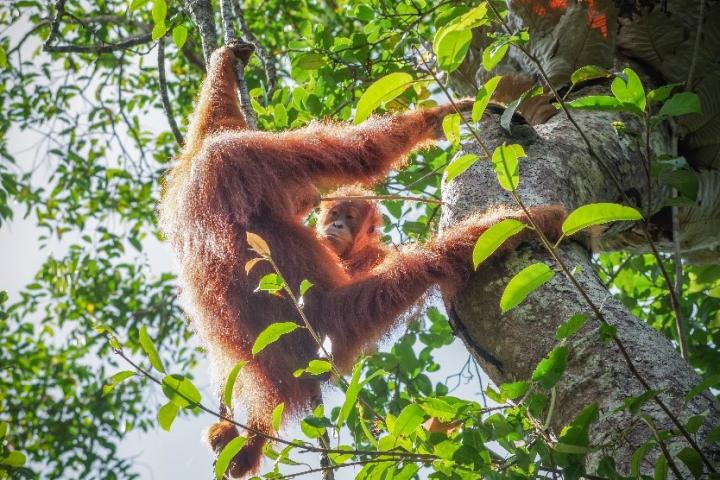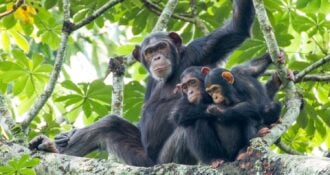
Young female and male orangutans direct their social attention to different types of individuals, potentially to acquire the sex-specific ecological knowledge they will need in later life, according to a study published this week in the open-access journal PLOS Biology by Leakey Foundation grantee Dr. Caroline Schuppli of the Max-Planck Institute of Animal Behavior.
Like humans, as a part of growing up, immature orangutans must acquire a vast set of skills and knowledge through several years of observational social learning and practice. Adult female and male orangutans show behavioral differences, including sex-specific foraging and dispersal patterns. Schuppli and colleagues investigated how these different life trajectories relate to social interest and emerging ecological knowledge in immature animals. They analyzed 15 years of detailed observational data on social learning and dietary patterns of 50 immature orangutans from two wild Sumatran populations. To measure social interest, the authors analyzed the number of “peering events” directed at others, and the amount of time spent in close proximity to others.
They found that throughout the dependency period, females direct most of their social attention toward their mothers, whereas males prefer individuals other than their mothers. By the end of the dependency period, females show a larger dietary overlap with their mothers than do males. When attending to non-mother individuals, males are most interested in immigrants, but females prefer neighbors.
Click here to support research like this.
All donations to the Primate Research Fund will be
quadruple-matched.
It may be more beneficial for the females to focus on acquiring local knowledge and skills because they tend to stay in the areas where they were born and settle in the same home range as their mothers. By contrast, immigrants might possess ecological skills and knowledge that will be relevant in the areas to which young males will eventually disperse. Taken together, the results suggest that immature orangutans have attentional biases which prepare them for their sex-specific adult foraging niches. According to the authors, the study highlights the importance of sex-specific social learning for immature orangutans and most likely other primates.
Dr Schuppli notes, “In our study we showed that immature orangutans show sex specific attentional preferences when observing role models other than their mothers. Our results also provide evidence that these biases result in different learning outcomes and may thus be an important way for orangutans to learn sex-specific foraging patterns. All in all, these results highlight the importance of fine-grained social inputs during development for orangutans – the least sociable of all ape species, and thus likely also for other primates.”
This research was conducted as part of the SUAQ Orangutan Project, a field research project that has been ongoing since 1994. The SUAQ Orangutan Project recently received funding from The Leakey Foundation’s Primate Research Fund, which was created to help keep long-term field research sites going when they face gaps in funding or other emergencies.
Citation: Ehmann B, van Schaik CP, Ashbury AM, Mörchen J, Musdarlia H, Utami Atmoko S, et al. (2021) Immature wild orangutans acquire relevant ecological knowledge through sex-specific attentional biases during social learning. PLoS Biol 19(5): e3001173. https://doi.org/10.1371/journal.pbio.3001173






Comments 0